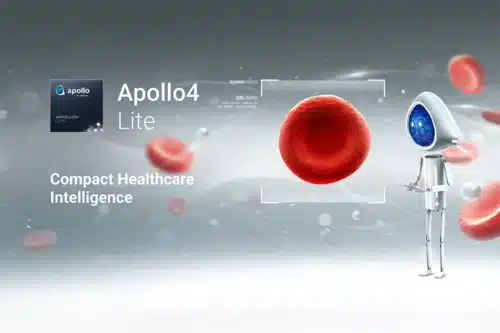- Ambiq has launched Apollo4 Lite & Blue Lite SoCs with turboSPOT technology, targeting digital health to smart home IoT.
- The chips promise enhanced graphics, memory, and unmatched developer flexibility.

Ambiq, an ultra-low power semiconductor products and solutions company, have launched Apollo4 Lite and Blue Lite System on chips (SoCs), providing feature-rich capability, optimised memory, and powerful graphics performance. The System-on-Chips (SoCs) encompass an ultra-low power Cortex-M4 core, proficiently achieving a clock speed of 192 MHz using turboSPOT technology. These cores operate in tandem with an audio subsystem, Graphics Processing Unit (GPU), and substantial Magnetoresistive RAM (MRAM) and Static RAM (SRAM). Being pin-compatible with Ambiq’s Apollo4 Plus and Blue Plus1, they offer developers unparalleled flexibility for innovation. The SoCs suit digital health applications like stethoscopes and glucose and blood pressure monitoring. They are tailored for various applications, including smartwatches, fitness bands, animal trackers, voice-activated remotes, industrial maintenance, and smart home IoT devices.
When executing from MRAM, the device boasts an ultra-low supply current, consuming just 4 μA/MHz. It offers low-power and deep sleep modes with selectable RAM/cache retention levels. The device supports Bluetooth Low Energy 5.1, which includes a 2 Mbps capacity, extended advertising packets, and both Angle of Arrival (AoA) and Angle of Departure (AoD) features. Its transmitter boasts an output power of up to +6 dBm, while the receiver maintains a sensitivity of -95 dBm. The chips are designed for advanced security and powerful graphics in small form factors, which is crucial for device adoption.
Some of the key specifications of the SoCs include:
- 4 μA/MHz executing from MRAM
- Up to 192 MHz clock frequency
- Tx: up to +6 dBm output power
- Rx Sensitivity: -95 dBm
- Up to 2MB of non-volatile MRAM for code/data
- Up to 1.4MB of low-power SRAM for code/data
- Up to 500 x 500 resolution
“Today’s patients are more empowered to monitor and advocate for their own health, and healthcare providers require more data analytics to prescribe holistic treatment,” said David Priscak, VP of Technical Solutions at Ambiq. “With bold graphics and long battery life, state-of-the-art health tracking is now more affordable and accessible thanks to these new additions to our Apollo4 SoC family.”
For more information, click here.






